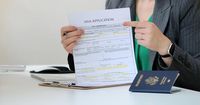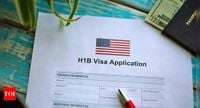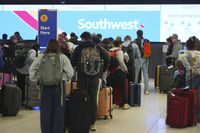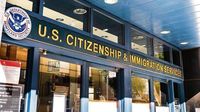As immigration policies in the United States intensify under the Trump administration, many visa holders are receiving strong advisories from immigration attorneys to reconsider their international travel plans. H-1B workers, F-1 international students, and green card holders are amongst the groups being cautioned about potential complications they may encounter while traveling outside the country.
Despite India not being listed among the proposed travel bans that could impact citizens from 43 countries, including Afghanistan and Pakistan, legal experts warn of increasing scrutiny at U.S. consulates and airports. Reports indicate a significant rise in delays for visa stamping, alongside extended processing times that can leave travelers in limbo for weeks or even months.
Immigration attorney Kripa Upadhyay, based in Seattle, stated, "Foreign nationals (especially those needing renewal of H-1B or F-1 visa stamps) really need to think twice about leaving the U.S. right now." This caution stems from a range of new policy changes and administrative practices that heighten the risk for those seeking re-entry into the United States.
Changes in visa renewal procedures have exacerbated the situation. The U.S. Department of State recently revised the rules for visa interview waivers, commonly known as "dropbox" applications. Previously, individuals whose visas expired within the last 48 months could renew them without an interview; this period has now been reduced to just 12 months. Consequently, many H-1B and F-1 visa holders must contend with in-person interviews for renewals, significantly complicating their travel plans.
As reported by a law firm, "Currently, the backlogs at U.S. consulates mean applicants should schedule appointments at least 4-6 months in advance to secure their visas." This is crucial for anyone wanting to exit the country, given the administrative delays currently occurring. Immigration experts state that the rigorous vetting process means even previously approved visas can face denials upon application — a change from the previous norm where prior approvals would generally ensure smoother processing.
The situation is particularly concerning for those embarking on short trips abroad, as reports indicate travelers have faced long delays in visa stamping upon return, alongside tight security checks and, in some unfortunate instances, detentions at airports. Upadhyay expressed deep concern about the current atmosphere at U.S. ports of entry: "Airports are witnessing extreme vetting, such as secondary inspections and even detention and questioning of returnees who immigration officials allegedly deem suspicious."
This increased scrutiny is not solely limited to visa holders. Even green card holders are experiencing heightened examination, with reports of secondary inspections and requests for surrendering permanent residency cards under duress. Elderly immigrants, especially those spending extended periods abroad while visiting family, are particularly vulnerable to these risks.
The law firm Nachman Phulwani Zimovcak (NPZ) noted on March 14 that the government has reinstated stricter consular review policies. Concerns were raised regarding potential consular refusals without the previous assurance of U.S. Citizenship and Immigration Services (USCIS) approvals, further straining those attempting to return to the U.S.
In light of these growing complications, experts highly recommend visa holders prepare solid contingency plans before traveling. Here are some suggested precautions discussed by immigration attorneys:
- Consult with an immigration attorney: Before making any travel arrangements, it’s vital to seek advice and clarify any legal uncertainties surrounding your current visa status.
- Check visa appointment availability: Those needing visa stamping should ensure they book appointments several months ahead of planned travels to avoid missing crucial timeframes.
- Maintain proper documentation: Carry essential documents while traveling, including a valid visa stamp, Form I-797 approval notice, employment verification letters, and recent financial records to establish ties to the U.S.
- Backup travel plans: If travelers face delays in visa processing or an unexpected administrative hold, having alternate arrangements can mitigate potential employment or re-entry issues.
As for returning to the U.S., customs officials are advised to question visa holders about their employment status, length of stay abroad, and detailed travel histories. Documentation proving ongoing employment and reasons for travel will be critical for those re-entering.
Overall, the current trajectory of U.S. immigration policies demands a careful approach for individuals holding H-1B, F-1, and other work visas. While there are no outright travel bans as of now, prospects of future complications make it essential for visa holders to weigh their travel plans carefully. Unless there is an emergency or critical need, many are encouraged to remain within U.S. borders to preserve their immigration status and ensure smooth re-entry.
As the landscape of U.S. immigration continues to evolve, the advice is clear: think ahead, prepare adequately, and consult the professionals to navigate these increasingly complex waters.




